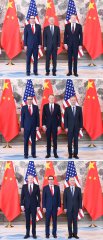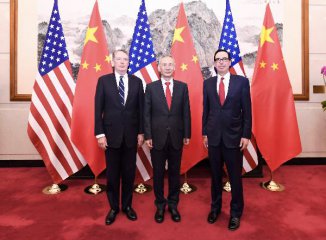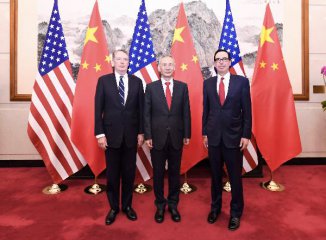President Donald Trump’s fresh tariffs on Chinese goods are likely to weigh on a U.S. expansion already set to slow and further scramble readings from key economic indicators.
Trump boosted tariffs Friday on $200 billion in goods from China and has said the process is under way to impose 25% levies on a further $325 billion. Instead of being paid by China, as Trump asserts, the tariffs would be paid by American companies and likely passed along to U.S. consumers, who make up the bulk of the economy.
Companies and Americans can absorb some higher costs or substitute cheaper items, but a bigger threat is to consumer and business confidence, said Stephen Stanley, chief economist at Amherst Pierpont Securities LLC. “If businesses sit on their hands and don’t invest until they figure out what’s going on here, it has the potential to be more significant,” he said.
The world’s largest economy will expand by 2.6% this year, according to a May Bloomberg News survey of economists that also showed the second-quarter forecast fell to 2% from 2.6% and second-half estimates little changed at about 2.1%.
With tariffs imposed, the Federal Reserve may be more inclined to cut interest rates, though won’t rush into doing so. Atlanta Fed President Raphael Bostic told reporters on Friday that the central bank could reduce rates if the higher tariffs prompt a severe cutback in consumer spending.
The higher tariffs imposed Friday could shave 0.2 percentage point from 2019 gross domestic product growth, Stanley estimates. That’s in line with others who see a hit of between 0.1 and 0.3 point -- including Oxford Economics, Societe Generale SA and Morgan Stanley -- in part assuming China retaliates with its own higher levies.
Economists said the impacts of the new tariffs will be spread out over a longer period of time because the levies won’t apply to shipments that are already in transit. More immediate effects will likely appear in inflation figures, with Citigroup Inc. and others projecting slight gains in price gauges.
Tariffs increased to 25% from 10% on 5,700 different product categories from China -- ranging from vegetables to furniture.
That would add to earlier complications, including a government shutdown at the start of this year and extreme weather, in getting a clear reading on the economy. First-quarter GDP, for example, was boosted by inventory stockpiles as companies rushed to beat an earlier tariff deadline while underlying growth was weaker.






















Latest comments